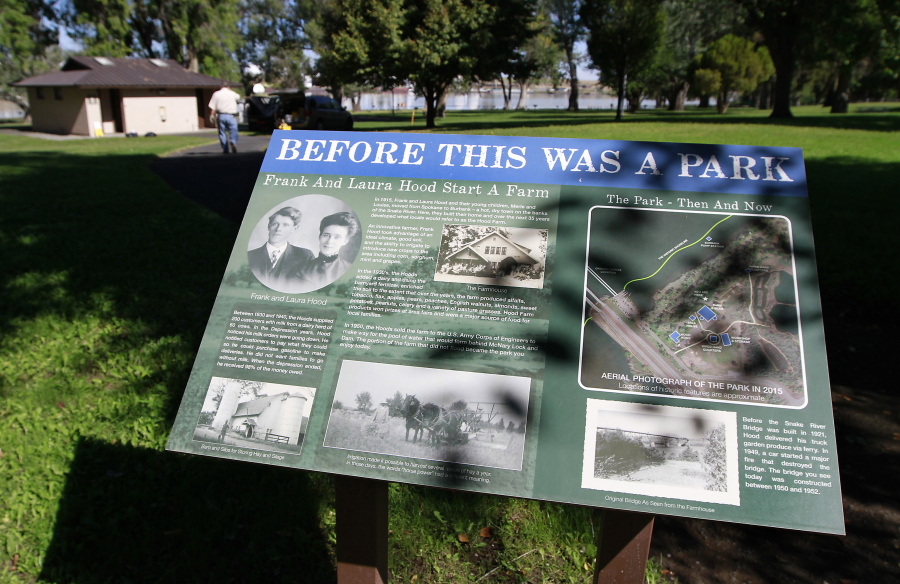KENNEWICK (AP) — Before Hood Park was a place to camp and fish, it was a farm and a home.
Jan Forrest remembers it well. She was 8 when she visited her grandparents, Frank and Laura Hood, on the banks of the Snake River.
“The swing! I remember the swing,” she said.
Laura Hood used to push her on the large swing.
“They were good grandparents,” said Forrest’s sister, Barbara Dobson.
Dobson and Forrest gathered recently with 25 others at Hood Park to dedicate a historical sign about the origins of the park, reported the Tri-City Herald (http://bit.ly/2c8MGIo). The family bought the sign, which was designed by Joe Menth and Fine Balance Imaging in Whidbey Island.
Dobson remembers her grandma teaching her how to use a cream pasteurizer.
The sisters said their grandparents, who came from German descent, had the best work ethic.
“We still have ’em,” Forrest said.
The family first moved to Burbank from Spokane 101 years ago with two young children, Merle and Louise, said grandson Maury Hood, who came from Whidbey Island with his wife, Donna, for the event.
Over the years, the Hood family and farm continued to grow while they grew corn, sorghum and grapes. In 1930, they added a dairy farm, in addition to producing alfalfa, apples, pears and other crops.
The Hoods ran into some trouble around the Great Depression, though — and so they added notes to some delivered milk bottles.
“I’m pretty self-sufficient on the farm, but I do have to buy gasoline,” Frank Hood wrote, telling them to pay what they could afford at the time. They could owe him the rest.
When the economy improved, those who were down on their luck ended up paying back 98 percent of what was owed.
“That’s a testament of the times and the community,” Maury Hood said.
The family had some tougher choices again years later.
The water behind McNary Lock and Dam was expected to flood the entire area in 1950. That’s when the Hoods sold to the U.S. Army Corps of Engineers. What wasn’t under water became Hood Park.
“It seemed to me that it was maybe hillier than this,” said Ray Fry, another grandson who now lives in Portland.
Fry remembers crawling into large cardboard boxes as a kid to roll down the hills and climbing cherry trees.
“It was a great life,” he said. “We spent a lot of time on that farm.”
Heather Geertsen is a longtime Burbank-area resident who serves as a park ranger for the U.S. Army Corps of Engineers. Her mom also worked there as a ranger.
“We got to enjoy the land in a more private setting,” Geertsen recalled.
Geertsen said about 67 campsites have summer weekends filled to capacity with visitors. There’s an amphitheater, playground and swimming area. The park is now closed for the season.
The community loves it.
“I see it all in the faces of the campers,” she said.
She thanked the Hood family members for their continued contributions.
“Your family’s legacy has continued on,” Geertsen told them.
——
Information from: Tri-City Herald, http://www.tri-cityherald.com



